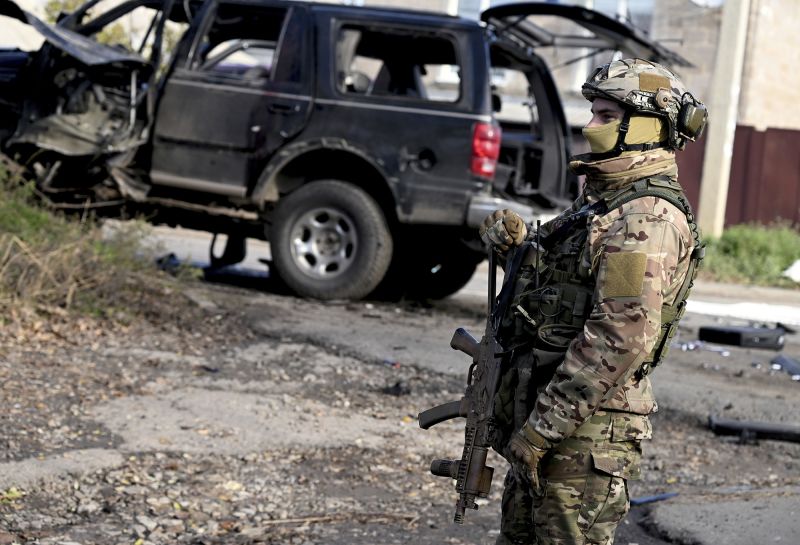
Pro-Russian official assassinated and Black Sea battles: Here’s what to know about the latest in Ukraine
The battle for dominance in the Black Sea raged on this week between Ukraine and Russia, as elsewhere each side’s forces continued the bitter fight for control in Ukraine’s east with winter looming.
Ukraine claimed it hit small Russian naval vessels with sea drones, demonstrating its determination to keep striking Russian positions at depth in occupied Crimea.
Meanwhile, a blast in Russian-occupied territory in Luhansk, eastern Ukraine, killed a pro-Moscow official, with a Ukrainian intelligence agency taking credit for the assassination.
Here’s what you need to know about developments this week in Ukraine.
The Black Sea front
Ukrainian Defense Intelligence (GUR) claimed it hit two small Russian naval vessels in the Black Sea on Friday, its latest display of Ukraine’s ability to hit Russian targets in occupied Crimea.
Defence Intelligence released grainy, grayscale video showing what it claims is the moment of the strikes.
Russia has not officially commented on the incident. But Russian military bloggers said unmanned boats had targeted Russia’s Black Sea fleet vessels.
Ukraine has been aggressive in going after targets in occupied Crimea as a part of a broader effort to hit Russian logistics, fuel, maintenance and command centers, in order to disrupt their ability to supply the front lines. Kyiv has also focused on breaking Russia’s dominance in Ukraine’s territorial Black Sea waters.
Moscow unleashed more missiles and attack drones on Odesa over the past week in an effort to hamper Ukraine’s ability to maintain a shipping route out of its Black Sea ports, Ukraine’s military said.
On Wednesday, a Liberian-flagged cargo ship was hit just as it approached port in the Odesa region, killing the ship’s pilot and injuring four others, according to Ukraine’s Operational Command South.
It is thought to be the first time a civilian vessel has been hit since Ukraine established the shipping route – what it calls a humanitarian corridor – from its ports out to the Black Sea, following the collapse of a UN-brokered deal allowing safe passage.
Ukrainian authorities have said the corridor remains open despite the attacks this week.
Fight for Avdiivka
The eastern town of Avdiivka is enclosed on three sides by Russian forces. They have been launching waves of assaults over the past month to complete the siege but Ukrainian soldiers continue “standing their ground and inflicting major losses on the occupiers,” according to Ukraine’s military.
The weather has been unfavorable for Russian assaults with tracked vehicles. That has made the Russians change tactics, according to the Ukrainian military. Russia’s forces have been using more drones to target heavily defended Ukrainian positions and carrying out more assaults on foot using infantry.
Ukrainian defenses are well dug-in in the town. Ukraine has been fortifying defensive positions since 2014, when pro-Moscow separatists seized a large portion of the Donbas region, including the nearby city of Donetsk. Avdiivka has been under fire since Russia launched its full-scale invasion in February 2022.
Those defensive positions are allowing the Ukrainian military to resist waves of relentless Russian attacks for now. A loss of territory at this point would be a blow to morale in Ukraine, where the summer’s much-vaunted counteroffensive delivered few gains.
Oleksandr Tarnavskyi, commander of the Tavria Joint Forces Operation, said in a post on Telegram: “We are still standing. And we will continue to stand. Because Avdiivka is not just a territory on the map, but a part of Ukraine, a part of the soul of Ukrainians and the Ukrainian Donbas.
“Let the enemy remember that we will continue to fight. For every building, terricone or lake…”
There has been little movement on the frontline despite Ukraine launching a counteroffensive earlier in the year.
Assassination claimed
In occupied Luhansk, a car explosion killed a pro-Moscow former head of police on Wednesday.
Ukraine’s Defense Intelligence took credit for the blast, saying it was an operation conducted jointly with pro-Ukrainian partisans.
Russian authorities launched an investigation into the explosion, which killed the former head of the so-called People’s Militia of the Russian-backed Luhansk People’s Republic (LPR) Mikhail Filiponenko. Moscow-backed separatists proclaimed a breakaway republic in Luhansk in 2014.
Defense Intelligence issued a warning to other pro-Russian officials in occupied areas, saying: “All addresses of traitors and places of their service to terrorist Russia in the temporarily occupied territories of Ukraine are known! Defense Intelligence of Ukraine states that all war criminals and collaborators will receive a fair retribution!”
There have been several assassination attempts against Russian-backed officials in occupied Ukraine. In May, the acting interior minister of the LPR, Igor Kornet, was “severely” wounded in an explosion.
European dream advances
In a milestone for Ukraine’s long and challenging quest to join the European Union, the bloc’s executive arm signaled it is politically ready for accession talks to formally begin.
Nearly 18 months since the bloc gave Ukraine conditional candidate status, the European Union’s executive body said the country is ready for detailed accession talks.
Ukrainian President Volodymyr Zelensky, who applied for EU membership in February 2022, shortly after Russia invaded Ukraine, welcomed the announcement. “Today, the history of Ukraine and the whole of Europe has taken the right step,” he said.
European Commission President Ursula von der Leyen call it “a historic day.” In a speech to the Ukrainian parliament last weekend, she said that Ukraine had “already completed way over 90%” of the bloc’s demands.
But there are caveats. The war remains a big obstacle. EU membership normally takes nearly a decade to achieve. Ukraine needs to continue to make progress on addressing corruption, limiting the influence of oligarchs and greater transparency.
Ukraine has held ambitions to join the EU for more than a decade. The aim of joining the bloc – along with NATO – has formally been part of Ukraine’s constitution since 2019.
